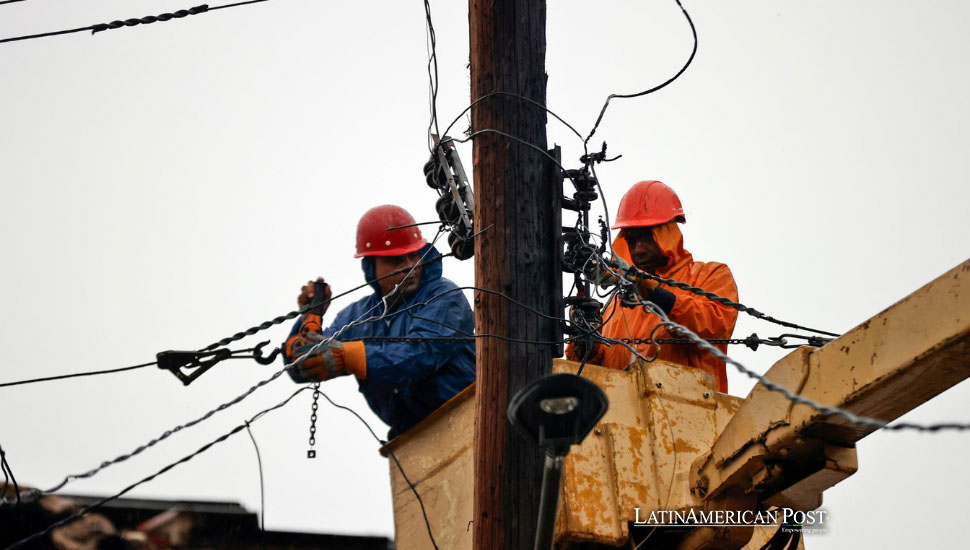Cuba Faces Ongoing Power Outages Amid Economic Struggles

Cuba’s persistent power outages continue to affect about 10% of the population during peak hours, exacerbating the country’s economic and social crises.
Cuba is grappling with significant power outages that affect about 10% of the population during peak energy consumption hours in the evening. The issue, reported by the state-owned Unión Eléctrica (UNE), has highlighted the country’s ongoing struggles with its energy infrastructure and economic stability.
The situation has slightly improved after severe outages in May and early June, which saw daily power cuts lasting over 10 hours in several provinces. However, the UNE forecasts a generation capacity of 2,595 megawatts (MW) against a demand of 2,750 MW for the current period, leaving a deficit of 155 MW. During peak hours, the actual impact could reach 225 MW.
Causes of the Power Outages
The Cuban government has announced that power cuts should be reduced to an average of less than three hours per user daily this month, with some days experiencing no outages. According to UNE, the primary causes of these interruptions include breakdowns and failures in thermoelectric plants, a lack of fuel, and scheduled maintenance.
Three generating units are out of service due to malfunctions, and one is under maintenance. Additionally, 39 plants and one floating unit are not operational due to fuel shortages. The National Electroenergetic System (SEN) is precarious due to the lack of imported fuel and recurring breakdowns in thermoelectric plants, which are obsolete after more than four decades of use without significant investments and maintenance.
To mitigate the generation capacity shortfall, the Cuban government has leased up to seven floating power plants over the past six years, although only five remain in operation. This solution is quick but temporary, costly, and environmentally unfriendly.
Economic and Social Impact
The frequent power outages severely damaged Cuba’s economy, which contracted between 1% and 2% in 2023. These disruptions hinder economic activities and fuel social discontent in a country already profoundly affected by a four-year-long economic crisis.
The power cuts have catalyzed anti-government protests in recent years, including the largest in decades on July 11, 2021, and another significant demonstration on March 17, 2023, in Santiago de Cuba and other localities. These protests reflect the growing frustration among Cubans over the deteriorating living conditions and the government’s inability to address the root causes of the energy crisis.
Cuba’s energy crisis is not isolated but part of a broader pattern of energy challenges in Latin America. Many countries in the region face similar issues with aging infrastructure, fuel shortages, and the need for substantial investments in energy systems. However, Cuba’s situation is exacerbated by its unique political and economic context, including longstanding trade embargoes and limited access to international financing.
Other Latin American countries have taken various approaches to address their energy challenges. For instance, Brazil has invested heavily in renewable energy sources like hydropower, wind, and solar, reducing its reliance on fossil fuels. Chile has implemented ambitious energy reforms to attract private investments in renewable energy projects. These efforts have helped mitigate energy shortages and positioned these countries as leaders in the global transition to sustainable energy.
Government Measures and Future Prospects
The Cuban government is under immense pressure to find sustainable solutions to its energy crisis. Its reliance on temporary measures, such as leasing floating power plants, is neither sustainable nor sufficient to meet the population’s growing energy demands.
To address these challenges, Cuba needs to explore long-term strategies, including investing in modernizing its energy infrastructure, diversifying its energy sources, and improving energy efficiency. Renewable energy sources, such as solar and wind, offer a promising alternative to reduce the country’s dependence on imported fuels and enhance energy security.
Moreover, international cooperation and support could play a crucial role in helping Cuba overcome its energy crisis. Partnerships with countries experienced in renewable energy technologies and access to global financing could facilitate the implementation of sustainable energy projects. However, such collaborations would require a shift in Cuba’s political and economic policies to foster a more favorable environment for foreign investments and technological exchange.
Cuba’s persistent power outages are a stark reminder of the country’s ongoing economic and social challenges. The energy crisis hampers economic growth and exacerbates social unrest, reflecting the deep-seated frustration among the Cuban population.
Addressing the energy crisis requires a multifaceted approach, including modernizing the energy infrastructure, diversifying energy sources, and improving energy efficiency. Learning from the experiences of other Latin American countries in transitioning to sustainable energy could provide valuable insights and strategies for Cuba.
Also read: Economic Crisis in Cuba Spurs Religious Revival and Migration
As Cuba navigates these complex challenges, the need for sustainable and long-term solutions becomes increasingly urgent. The future of Cuba’s energy sector will depend on the government’s ability to implement effective reforms, attract investments, and leverage international cooperation to build a resilient and sustainable energy system.





